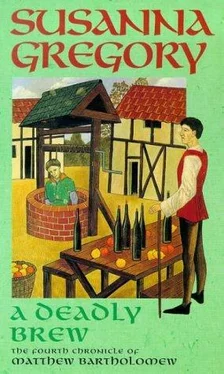Susanna Gregory - A Deadly Brew
Здесь есть возможность читать онлайн «Susanna Gregory - A Deadly Brew» весь текст электронной книги совершенно бесплатно (целиком полную версию без сокращений). В некоторых случаях можно слушать аудио, скачать через торрент в формате fb2 и присутствует краткое содержание. Год выпуска: 2013, Жанр: Исторический детектив, на английском языке. Описание произведения, (предисловие) а так же отзывы посетителей доступны на портале библиотеки ЛибКат.
- Название:A Deadly Brew
- Автор:
- Жанр:
- Год:2013
- ISBN:нет данных
- Рейтинг книги:5 / 5. Голосов: 1
-
Избранное:Добавить в избранное
- Отзывы:
-
Ваша оценка:
- 100
- 1
- 2
- 3
- 4
- 5
A Deadly Brew: краткое содержание, описание и аннотация
Предлагаем к чтению аннотацию, описание, краткое содержание или предисловие (зависит от того, что написал сам автор книги «A Deadly Brew»). Если вы не нашли необходимую информацию о книге — напишите в комментариях, мы постараемся отыскать её.
A Deadly Brew — читать онлайн бесплатно полную книгу (весь текст) целиком
Ниже представлен текст книги, разбитый по страницам. Система сохранения места последней прочитанной страницы, позволяет с удобством читать онлайн бесплатно книгу «A Deadly Brew», без необходимости каждый раз заново искать на чём Вы остановились. Поставьте закладку, и сможете в любой момент перейти на страницу, на которой закончили чтение.
Интервал:
Закладка:
At the dais to the front of the hall, Bingham looked up from his sheaf of notes and paused for breath. Immediately, someone began to clap. Bartholomew saw it was Thomas Kenyngham, the gentle Master of Michaelhouse, beaming his customary seraphic smile and nodding in a congratulatory manner to Bingham. Seizing the opportunity for an early end to the tedious speech, everyone else hastened to join in the applause, while the Fellows of Valence Marie prepared to lead the procession out to the church. The students began to sing, while the people in the hall stretched stiff limbs in evident relief. Bingham’s mouth dropped open in dismay, but his Fellows clustered about him to offer their felicitations, and then the procession was on the move. Bingham had to scamper to take his place of honour behind them, or run the risk of being left behind.
Amused by Bingham’s discomfiture, Bartholomew waited for the Fellows from his own College as the other guests filed past him. Master Kenyngham led the Michaelhouse deputation, a guileless smile still playing about his lips, his eyes raised heavenward and his lips moving in prayer. Bartholomew had no doubt that Kenyngham’s timely interruption of Bingham’s speech was wholly innocent: of all the scholars in the University, the honest, kindly Gilbertine friar would be the least likely to do something purposely malicious.
Behind Kenyngham scurried Roger Alcote, a small, vindictive man whose ambitious eyes were already on the Mastership currently occupied by Kenyngham. Blind Father Paul leaned on the arm of Father William, both Franciscan friars who taught theology and the Trivium — grammar, logic, and rhetoric. Michael brought up the rear with Michaelhouse’s newest Fellows — John Runham, who taught law, and Ralph de Langelee, who lectured in philosophy.
Runham was the cousin of a previous, highly unpopular Master of Michaelhouse who had died during the plague, and seemed to have inherited some of his detested kinsman’s less loveable traits: he was arrogant, smug and condescending. But he was easily one of the best teachers of law Michaelhouse had ever seen. His lectures were eloquent, precise and logically flawless, and his reputation meant that the College was inundated with applications from students who wanted him to teach them. Because the numbers of new would-be scholars were low following the plague, a popular master like Runham was a valuable commodity, and Bartholomew tried hard to maintain a cordial relationship with him for the College’s sake.
Meanwhile, Runham’s room-mate, Ralph de Langelee, did not look at all like a philosopher: he was a hulking figure with brawny arms so heavily muscled that they jutted from his body at an angle. As he passed, Langelee shot Bartholomew an unpleasant look for being late, which Bartholomew ignored. Although Langelee had only been a Fellow for a few weeks, he had already made himself unpopular with the students and staff. He bullied the servants, belittled his undergraduates, and tried to thwart every attempt Bartholomew made to improve living conditions at Michaelhouse.
Unlike Runham, Langelee was not a good teacher. His lectures were confused and filled with contradictions, and he did not seem to enjoy them any more than did his bewildered students. He compensated for his lack of skills by making it known around the University that he was available for any other kind of work, and was making a fortune by acting as scribe and writing letters for the rich and illiterate in his ugly, laboured roundhand. Bartholomew did not like Langelee, a feeling he was sure was fully reciprocated, and avoided his company whenever possible. The physician worked hard at his teaching and his ever-growing practice of patients, and did not want to waste the little free time he had in the company of an arrogant, opinionated man like Langelee.
Michael dropped behind the two new Fellows so that he could walk with Bartholomew.
‘I have had a complaint from the porter with whom we left that wine,’ he said, speaking in a low voice so that he would not be overheard. ‘According to him, he was moving the bottles to a safer place — although I imagine what really happened was that he was wondering whether they were worth stealing, or perhaps siphoning and diluting.’
‘What happened?’ asked Bartholomew anxiously. ‘I hope to God he did not drink any.’
‘Fortunately for him, no,’ said Michael. ‘But he touched the bottle, as you specifically instructed him not to do. He has a burn on his hand the size of an egg.’ He shuddered. ‘Lord help us, Matt! What is that stuff?’
Chapter 2
Bartholomew told Michael about Mortimer’s lemons as they walked to St Botolph’s Church where prayers would be offered for the new Master and his College. As if to compensate for the long ceremony at Valence Marie, the College priests rattled through the mass at a speed that left the congregation bewildered, after which everyone trooped back to Valence Marie for the feast. Evidently, the servants had anticipated more time to prepare, for the hall was in disarray and students had to be commandeered into helping set up trestle tables and lay out trenchers, while the guests milled about in the courtyard in growing ill humour. By the time the steward announced that the feast would begin, most people were cold, wet and irritable.
The feast itself, however, was impressive and Bartholomew imagined that Mortimer would be sorely disappointed to learn what he had missed. As Michael had predicted, the highlight of the meal was roast boar, each animal carried on a huge platter by two servants. Bartholomew, used to simple Michaelhouse fare, ate sparingly, and did not need the example of Mortimer to warn him of the dangers of over-indulgence. Next to him, Michael ate as though it were his last meal on Earth, while, on his other side, Langelee provided impressive competition. Wine flowed freely and, as the feast progressed, the hall became hot, noisy and stuffy. The final course, produced with a flourish by Valence-Marie’s steward, was lemons stewed with cinnamon and black pepper, which once again reminded Bartholomew of Mortimer. Thomas Deschalers the grocer must have made a good deal of money from his shipment of lemons, Bartholomew thought, declining the dish as it was offered. Michael helped himself to a generous portion, but left most of it, puckering his lips and screwing his eyes tightly closed at the sourness.
As the daylight faded, braziers around the wall were lit, making the room hotter than ever. Michaelhouse possessed no such braziers and Bartholomew was envious, for the light was ample by which to read and even one such lamp would have eased the boredom of long, winter nights when darkness came early. Valence Marie possessed fine silver, too, and huge jewelled chalices were placed at regular intervals along the tables, filled with almonds and raisins — expensive commodities that were just one indication of the feast’s extravagance.
When the meal was over and the tables vaguely cleared of spilled grease, animal bones and bread trenchers, Master Bingham rose to his feet, an intimidating sheaf of parchments clutched in his hands. He cleared his throat importantly, and looked haughtily around the hall at the assembled guests who were about to be treated to that part of his painstakingly prepared discourse he had been deprived of giving earlier. Michael groaned loudly and Bartholomew felt his heart sink. But Bingham had done no more than make a preparatory rap for silence on the table with his spoon before the student minstrels in the gallery increased the volume of their singing dramatically and the Fellows on either side of their new Master reached up to pull him back into his seat. Thorpe, the previous Master of Valence Marie, would never have countenanced such an affront to his authority, thought Bartholomew, amused by Bingham’s ineffectual outrage at his colleagues’ presumption.
Читать дальшеИнтервал:
Закладка:
Похожие книги на «A Deadly Brew»
Представляем Вашему вниманию похожие книги на «A Deadly Brew» списком для выбора. Мы отобрали схожую по названию и смыслу литературу в надежде предоставить читателям больше вариантов отыскать новые, интересные, ещё непрочитанные произведения.
Обсуждение, отзывы о книге «A Deadly Brew» и просто собственные мнения читателей. Оставьте ваши комментарии, напишите, что Вы думаете о произведении, его смысле или главных героях. Укажите что конкретно понравилось, а что нет, и почему Вы так считаете.












